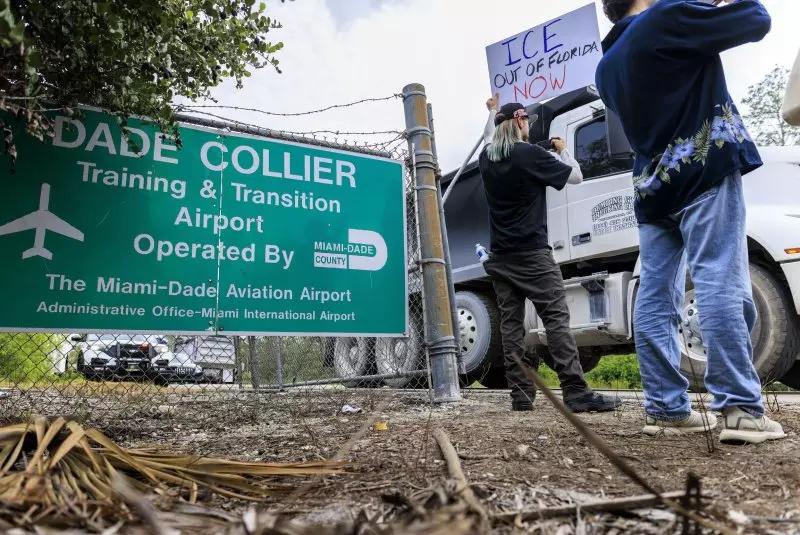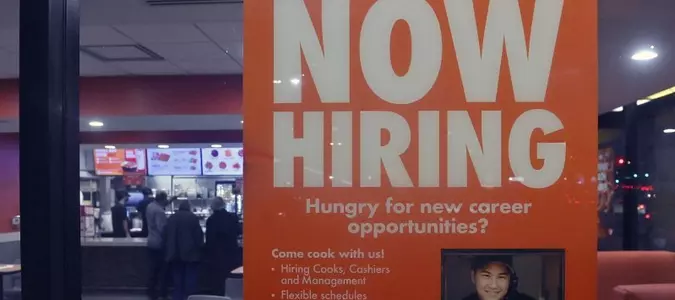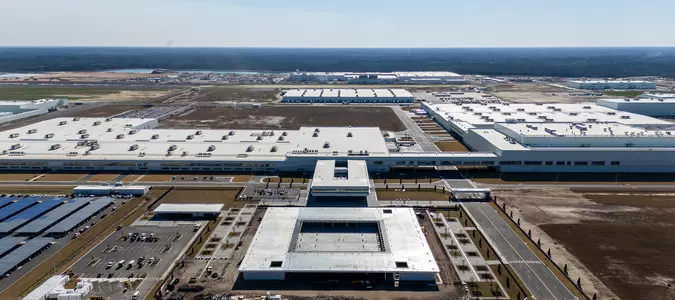

Alligator Alcatraz inspires more immigrant detention facilities
State officials in Louisiana, Indiana and Nebraska are taking cues from Florida's so-called "Alligator Alcatraz" to expand detention space for immigrants.

Activists attend the 'Stop Alligator Alcatraz' protest in front of the entrance of the Dade-Collier Training and Transition Airport in Ochopee, Fla., on June 28. File Photo by Cristobal Herrera-Ulashkevich/EPA UPI
Sept. 8 (UPI) -- State officials in Louisiana, Indiana and Nebraska are taking cues from Florida's so-called "Alligator Alcatraz" to expand detention space for immigrants.
More than 61,000 immigrants are in detention in the United States as of the latest update on Aug. 24 by the Transactional Records Access Clearinghouse, a nonpartisan research center at Syracuse University. About 70% of detainees have no criminal convictions.
President Donald Trump has claimed through his campaign and into his current term in the White House that his immigration policy will focus on detaining and deporting criminals he deems "the worst of the worst." According to TRAC Reports, only 1.55% of new deportation orders in fiscal year 2025 were based on alleged criminal activity.
After Florida's pop-up detention facility in the Everglades, "Alligator Alcatraz," garnered the attention and support of federal officials, including the president, officials in other states have proposed their own plans to detain immigrants.
ICE's plan to expand detention
At stake for those states is a share of the $45 billion infusion of federal funds into detention and deportation efforts approved by Congress in its budget reconciliation package.
The funding aims to expand detention space for immigrants, adding 80,000 new beds.
"Maintaining current bedspace is critical for enforcing immigration law and removing illegal aliens form the United States," a U.S. Immigration and Customs Enforcement spokesperson told UPI. "As ICE arrests and removes criminal illegal aliens and public safety threats from the U.S., the agency has worked diligently to obtain greater necessary detention space while avoiding overcrowding."
Being in the United States without authorization is a civil offense, not a crime.
The ICE spokesperson said ICE has the funding to bring more than 60 new detention facilities online for immigrant detention. It has already made arrangements for 18,000 additional detention beds, some of which are active and others are pending.
Names like "Cornhusker Clink" in Nebraska, or Indiana's proposed "Speedway Slammer" downplay the conditions that detainees are dealing with, who largely have not committed a crime or who have already served their punishment for past crimes, critics say.
"We see this in other countries who have experienced mass atrocities," Haddy Gassama, senior policy counsel in the ACLU's National Policy Advocacy Department, told UPI. "It's dehumanizing, making light of or sanitizing something so horrific. It is also worrisome in the sense that some of these states are seeing this as an opportunity to either attempt to get some federal revenue into their states at the risk of a whole bunch of other issues, or to be in this administration's good graces."
The Department of Homeland Security is embracing the idea of more new detention space. Last month it announced new partnerships with the states of Nebraska, Indiana and Louisiana. In its press releases announcing these partnerships, DHS credits "Alligator Alcatraz" as the inspiration for new detention spaces.
Unlike "Alligator Alcatraz," these states are looking to existing facilities for expand detention space.
"Louisiana Lockup"
The Louisiana State Penitentiary is making 416 beds available for ICE detention. The prison, also known as Angola Prison, is the largest maximum security prison system in the United States.
The U.S. State Department's 2023 report on the prison noted "significant human rights issues" that included arbitrary and unlawful killings, cruel and inhumane treatment of prisoners and life-threatening prison conditions.
"Angola has a long and storied history," Silky Shah, executive director of the Detention Watch Network, told UPI. "As somebody who started doing this work many years ago and growing up in Texas, the story of Angola and the people who had been put in solitary confinement for decades and the 'Angola Three' was such a central story to learning about this prison system and the harms of the prison system."
Three Black men -- Robert Hilary King, Albert Woodfox and Herman Wallace -- became known as the Angola Three after spending more than 40 years in solitary confinement at Angola Prison. Woodfox was the last to be released from prison in 2016.
"Federal intervention has happened around Angola. Really one of the worst facilities in the world," Shah said.
More than 4,000 inmates are detained at the Angola Prison. The average daily population between 2022 and 2023 was 4,716, according to a report by a Prison Rape Elimination Act auditor.
The "Louisiana Lockup" detentions will take place in Camp J, a four-building section of the penitentiary that has been closed for several years. When it was in operation, it was referred to as the "Dungeon" due to much of its space being dedicated to solitary confinement.
"The question is are they going to put in the investment to bring it up to constitutional standards before they start putting people in there?" Joseph Margulies, professor of practice in the Department of Government at Cornell University. "In their zeal to be cruel to people, are they going to cut these corners around conditions?"
As an attorney, Margulies represented prisoners who were held at Guantanamo Bay after Sept. 11 in the first case brought against the administration of President George W. Bush regarding post-Sept. 11 detainments.
Eight Black inmates sued the Louisiana Department of Public Safety and Corrections, the Louisiana State Penitentiary and the state's Department of Public Safety and Corrections for alleged racist mistreatment while performing forced labor at the prison. They are suing on behalf of others who are similarly situated, according to court filings.
The men work on Farm Line 24/25, a work assignment that places inmates in the prison's agriculture fields picking crops. The men allege they have been subject to racist epithets from guards, told to defecate out in the open fields and threatened to be hanged.
The lawsuit alleges that working on the Farm Line is an Eighth Amendment violation because it subjects inmates to cruel and unusual punishment, due to working in dangerous heat and overall poor conditions.
They also alleged it was a Thirteenth Amendment violation because it subjected them to involuntary servitude as punishment. A judge dismissed this claim.
Nebraska's "Cornhusker Clink"
Nebraska Gov. Jim Pillen said in a statement on Aug. 19, announcing that the McCook Work Ethic Camp in McCook, Neb., will be converted into an immigrant detention facility. The camp is located on the outskirts of the community in rural Southern Nebraska.
McCook has a population of about 7,400 according to the 2020 census.
"I am pleased that our facility and team in McCook can be tasked with helping our federal partners protect our homeland by housing criminal illegal aliens roaming our country's communities today," Pillen said. "I am also proud that the Nebraska State Patrol and National Guard will be assisting ICE enforcement efforts, as well."
A Nebraska legislative report on the McCook Work Ethic Camp, published in November, said it was once referred to as an incarceration work camp. It is meant to reduce prison overcrowding so there is space for violent offenders.
The facility began accepting probation offenders in 2001. It used to house male and female detainees but since 2013 it has only accepted males.
The McCook Work Ethic Camp has 200 beds. At the time of the November report, 197 people were housed there.
The press release from the Department of Homeland Security says it will expand to 280 beds for immigrant detainees.
Indiana's "Speedway Slammer"
Indiana is adding 1,000 beds for immigrant detention at the Miami Correctional Facility in Bunker Hill, Ind. The facility is located about 3 miles southwest of the small, rural town.
Bunker Hill had a population of 888 people during the 2020 census.
Annie Goeller, chief communications officer for the Indiana Department of Correction, told UPI there is not yet a timeline for beginning to detain immigrants at the facility.
"We do not have a timeline yet and are determining details, including funding," she said.
The facility is designed to hold 3,188 detainees at full capacity. According to a 2024 report by a Prison Rape Elimination Act auditor there was an average daily population of 1,424 for the 12 months ending in September 2024.
There were 10 allegations of staff-on-inmate sexual abuse that resulted in criminal investigations at the facility. One was referred for prosecution and three more were ongoing at the time of the report.
The facility was determined to be compliant with the Prison Rape Elimination Act, a federal zero-tolerance standard for sexual abuse and harassment in U.S. prisons. The auditor confirmed that inmates have multiple ways of reporting abuse, also meeting minimum standards.
The auditor noted that in at least one instance it was unclear if a victim was provided the opportunity to connect with a victim advocate. The victim was airlifted to a local hospital with serious injuries including likely head trauma. As corrective action, the facility's staff must document whether or not an advocate is offered to victims of violence and sexual abuse.
The prison was also deemed to have met standards for access to emergency medical and mental health services and for accommodating detainees with disabilities and detainees who have limited English proficiency.
















